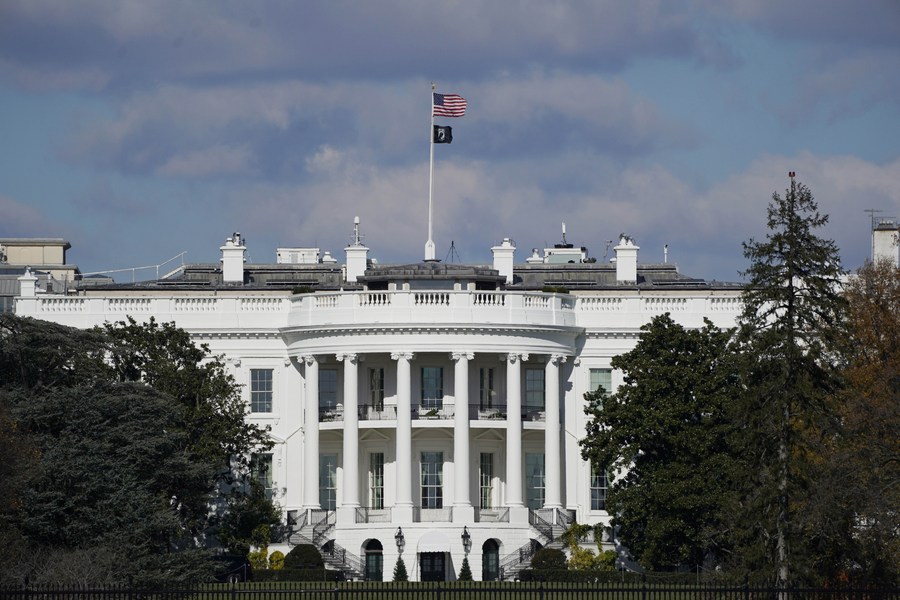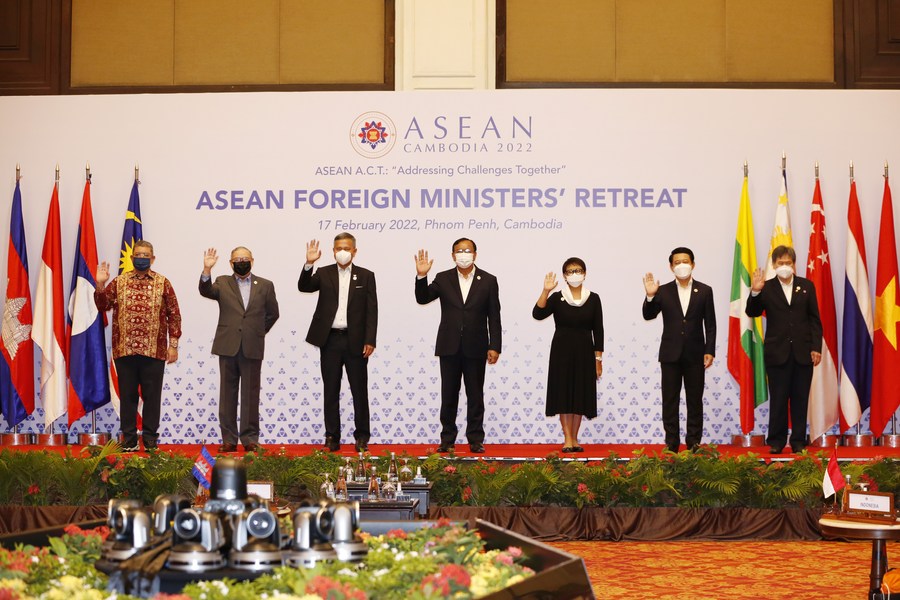U.S. urged not to rope in Southeast Asian countries out of geopolitical interests

Photo taken on Nov. 23, 2021 shows the White House in Washington, D.C., the United States. (Photo by Ting Shen/Xinhua)
The United States "shall fail in attempts to counter China, because most ASEAN countries want to expand economic exchanges and other cooperation with (their) regional neighbor China," Wilson Lee Flores, a columnist for the English daily The Philippine Star, told Xinhua.
BEIJING, May 14 (Xinhua) -- The just-concluded U.S.-ASEAN summit will not draw regional countries closer to the U.S. side, and the U.S. attempt to court support among ASEAN in pursuit of its geopolitical interests is unlikely to gain traction, experts have said.
U.S. President Joe Biden met leaders of the Association of Southeast Asian Nations (ASEAN) countries at the White House during a summit held on Thursday and Friday, a move widely seen as an attempt by the world's sole superpower to pull members of the bloc into its camp against a rising China.

U.S. President Joe Biden arrives at the White House in Washington, D.C., the United States on Jan. 24, 2022. (Photo by Ting Shen/Xinhua)
U.S. ATTEMPTS SHALL FAIL
Against the backdrop of escalating tensions between Russia and Ukraine, the U.S.-initiated summit was widely viewed as a signal to highlight the importance of what America calls the "Indo-Pacific" region out of strategic concerns, and to counter the rising influence of China in the region.
Lee Pei May, a political expert at the International Islamic University Malaysia, said while the summit occurred amid the tougher Russia-Ukraine conflict, the primary concern of the Biden administration is not about Russia, but more about ensuring a so-called "free and open" Indo-Pacific.
"For the Biden administration to advance this vision, they have to get ASEAN countries on the American side and potentially for the U.S. to play a role in managing the disputes in the South China Sea," she said. "Such moves can be interpreted as challenging China's position in the region and hindering peaceful progress between China and ASEAN countries."
The summit's significance lies in its timing, reported Foreign Affairs magazine on Wednesday. "It is being held as war rages in Ukraine, demonstrating that the United States has not lost its focus on the Indo-Pacific," the report said, adding "U.S. President Joe Biden seeks to better position his country in the wider geopolitical competition with China."
Yet, the United States "shall fail in attempts to counter China, because most ASEAN countries want to expand economic exchanges and other cooperation with (their) regional neighbor China," Wilson Lee Flores, a columnist for the English daily The Philippine Star, told Xinhua.
Flores noted that Washington was also aimed at convincing ASEAN countries to take tougher public positions and join its sanctions against Russia, which, likewise, shall fail. "Most of ASEAN seek to promote dialogue, diplomacy and stability in crisis areas due to ASEAN's traditional position of non-interference and upholding consensus."
Joseph Matthews, a senior professor at the BELTEI International University in Phnom Penh, said that the United States should not use the summit to coerce and pressure ASEAN into submitting to its will and approach against Russia and China.
Commenting on the Western sanctions and illegal embargoes on Russia, Ky Sereyvath, director general of the Institute of China Studies at the Royal Academy of Cambodia, said these sanctions will harm the global economy.
"I think the rise in fuel prices will not slow down if the Ukraine crisis still continues and the U.S. still push this war forward," Sereyvath added.
As the United States is scrambling to combat a sluggish economy and simmering social disorder amid COVID-19, its capability to fulfill promises to other countries has come under question.
"The U.S. now has limited capacities to deliver on its promises, due to its own political and economic challenges, especially with the upcoming midterm elections in November," Flores cautioned.
"The U.S. can still lobby to export its weapons to ASEAN. It can still attempt (to carry out) political or diplomatic initiatives. It can also attempt to pursue security alliances. But its waning economic activities and influence in Asia will weaken its strategic presence and leverage," the columnist noted.
From the "Pivot to Asia" to the "Indo-Pacific Strategy," the United States has been teaming up its allies and regional countries to contain China. Washington never stops hyping up the concept of "Indo-Pacific" to peddle the targeted strategy at economic, political and military levels.
A recent report by the U.S. Center for Strategic and International Studies showed that many ASEAN members have expressed concerns that the so-called "Indo-Pacific Economic Framework" is "primarily a political endeavor meant to counter China, rather than a sincere and thoughtful economic policy integration initiative."
This viewpoint was echoed by Veronika Saraswati, researcher at Indonesia's the Center for Strategic and International Studies. "It is not hard to see that although the United States wants to strengthen its influence in ASEAN, it has not built cooperation with ASEAN countries in a more concrete level, only symbolic."

ASEAN foreign ministers pose for a group photo during the ASEAN foreign ministers' meeting (AMM Retreat) in Phnom Penh, Cambodia, Feb. 17, 2022. (Photo by Sovannara/Xinhua)
ASEAN NATIONS WON'T TAKE SIDE
Many believe that ASEAN members, now with a primary focus on post-pandemic economic recovery, will maintain neutrality at the forefront and neglect the attempts to pressure them into a U.S. sphere of influence.
With China rising "sharply out of expectation," the United States "is afraid of losing its control" in Southeast Asia and found it necessary to hold tighter their hegemonic power, Saraswati pointed out.
The Indonesian researcher stressed that Southeast Asian countries, including Indonesia, certainly do not want to be dragged into the competition between major powers.
"Powerful countries should never use coercive measures to force other countries to choose side," she noted. "For a long time, the exercise of hegemonic power by the U.S. and its allies has had a deep impact on the survival and development of many countries."
The United States will find itself unable to make any headway among ASEAN members, especially after Malaysia and Indonesia voiced concerns over the AUKUS trilateral security partnership involving Australia and Britain, said Azmi Hassan, a senior research fellow at Nusantara Academy for Strategic Research.
Hassan gave the persuasive example that the United States has been unable to exert pressure on ASEAN over the Russia-Ukraine conflict, with most of the 10-member bloc abstaining from voting in favor of a resolution to suspend Russia from the United Nations Human Rights Council last month.
"Bringing up controversial issues, forcing and coercing ASEAN member states to support its approach and agenda in the region, and trying to divide ASEAN on any issues will undermine the credibility and authenticity of the whole summit. The U.S. should be mindful of it," Matthews told Xinhua.
Rather than pressing the bloc to follow its scenarios or agendas against other countries, Washington should use the meeting to express support for ASEAN's post-COVID-19 socioeconomic recovery, Kin Phea, director-general of the International Relations Institute at the Royal Academy of Cambodia, told Xinhua.
"What the U.S. should do is encouraging ASEAN to adhere to its principle of centrality, solidarity and unity," he said, adding the United States should also respect ASEAN's rights in making decisions and refrain from using economic, political or security pressure to bargain with ASEAN or to force ASEAN to make decisions in its favor.
"The U.S. must respect the common interests of the ASEAN, the region and the world, and should not put forward any scenarios or agendas that lead to ASEAN's rift and instability in the region," he said.
VIGILANCE, UNITY URGED IN ASEAN
It is essential for the 10-member bloc to stand in solidarity against the U.S. interference for the sake of regional peace, stability, development and prosperity, Phea said.
Matthews also urged ASEAN leaders to be vigilant about the Quadrilateral Security Dialogue among the United States, Japan, Australia and India, and the Australia-U.K.-U.S. pact, saying both military-cum-security alliances are posing a major security threat to ASEAN and the whole Asia region.
"These alliances will trigger a conventional and nuclear arms race in the region, and thus destabilize peace and security, undermine economic development and destroy the ASEAN's centrality," he said.
Unless it can demonstrate unity, ASEAN may find itself in a position where different members pursue different paths, which could compromise its cohesiveness, Lee cautioned. "This can be remedied by member states forging a consensus when dealing with the United States."
"Having a consensus on key issues is not easy, but it is crucial as it would allow the members to speak with one united voice at the summit," the Malaysian expert noted. "The members can send a signal to the U.S. that ASEAN would remain neutral in whatever circumstances."
Photos
Related Stories
- Grief of 1 million COVID deaths in U.S.
- U.S. summit won't sway ASEAN centrality, say analysts
- Flags ordered at half staff as U.S. nears 1 mln COVID-19 deaths
- Hospital labor expenses surge in U.S. during pandemic
- Wealthy Americans buying second passports, citing pandemic, climate change, political turmoil: report
Copyright © 2022 People's Daily Online. All Rights Reserved.










